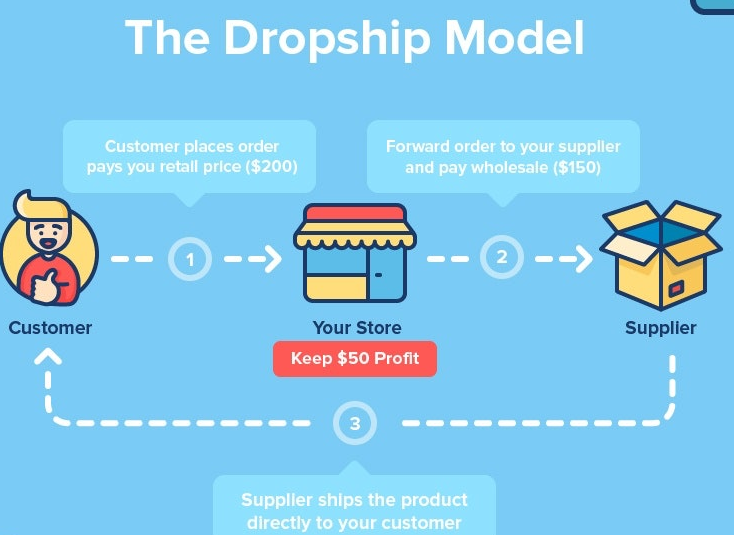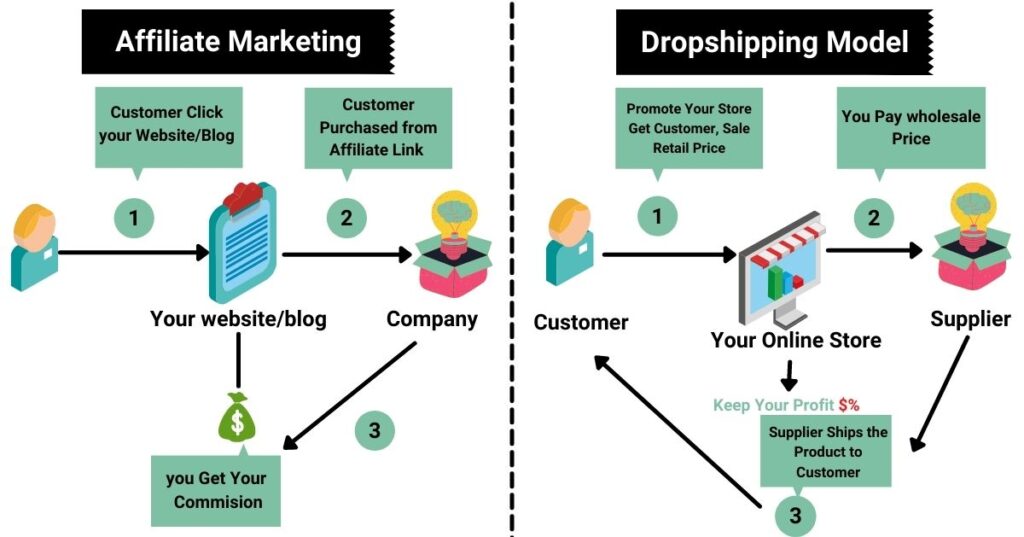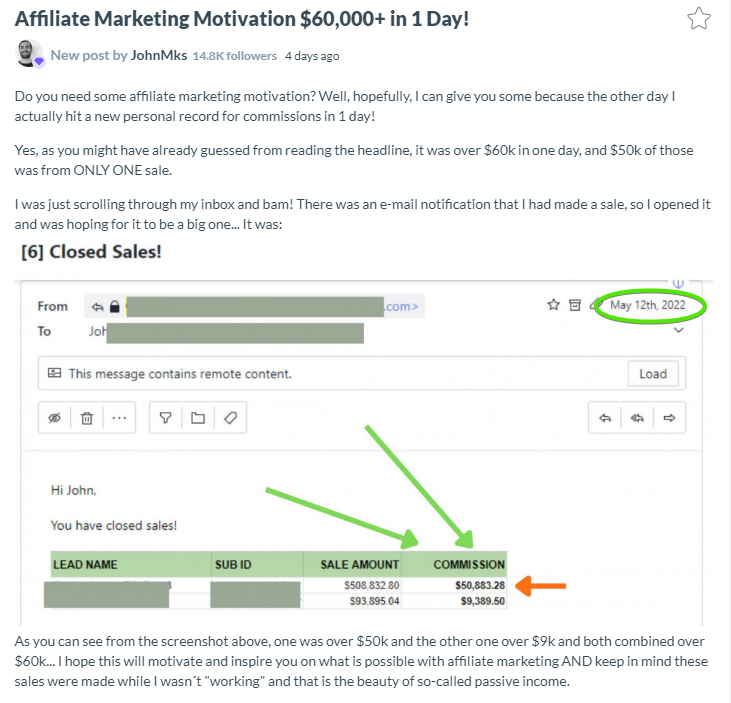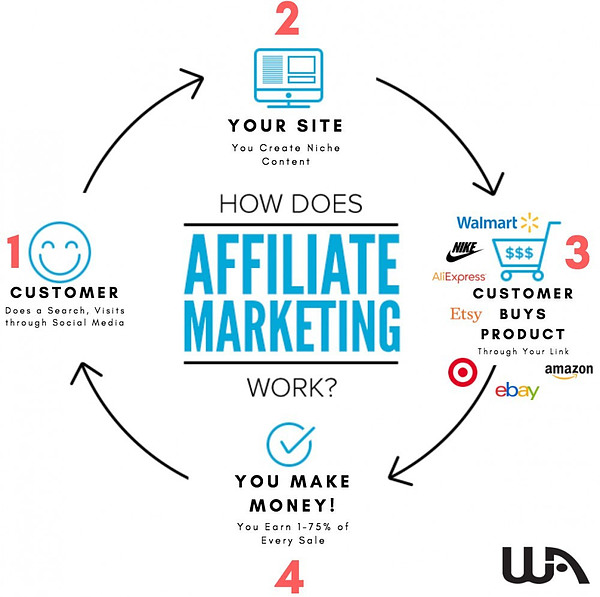Have you been looking for ways to make some extra money? Maybe start your own home business? Or, maybe you’re just curious about what a drop shipping business actually is. Well, in today’s digital landscape, and as the world of e-commerce continues to evolve, there are numerous opportunities for anyone, even beginners, to establish successful online businesses.
Two popular business models that have gained significant attention are drop shipping and affiliate marketing. Both approaches offer unique advantages, challenges, and require different strategies for success making it essential to understand their differences to make an informed decision. But how do learn which is right for you? How do you sort through all of the clutter and BS to know what is legit and what is just another SCAM?
QUICK LOOK:
When deciding between drop shipping and affiliate marketing, there is no one-size-fits-all answer. Drop shipping allows for greater control over the entire customer experience and offers higher profit margins, but it involves managing payments, suppliers and customer support. On the other hand, affiliate marketing provides flexibility, minimal upfront costs, and the potential for passive income, but it relies on the reputation and reliability of affiliate programs. You can switch from one to the other or run both simultaneously if you so desire. I recommend affiliate marketing for it’s simplicity and less customer support and payment issues.
Where Can You Find “Real” Information?
That’s what I am going to try and clear up for you here today. We’ll take a look at how you can start your very own profitable online drop shipping business or affiliate marketing business, or both. And then you can decide which would be the best option for you. Because, let’s face it, only you know what will work for you and your business needs, abilities, time, and resources.

I can tell you what I think and what I like all day long, but if it’s not a good fit for you, then it doesn’t matter. Now, I know you’ve probably seen some “Gurus” advetising their latest greatest training or course on how to build a “six-figure” drop shipping store. They like to walk around mansions, in front of expensive cars, or on private planes to make it look like they’re rich and successful.
Just a heads up, most of those are rented props for their ad shoot. They don’t own them, it’s all smoke and mirrors to build up your hopes and dreams.
Well, I’m no “Guru”. No mansions, fancy cars, or planes here. I’m just a normal guy that has spent a lot of time testing and trying various online business opportunities. Some good, some……..not so good.
Bottome line, most will work but, they tend to over-hype the dream and skip over the WORK, time and money it takes!. I’ve wasted plenty of my hard earned money on courses that wasted my time and left me discouraged, disappointed, and with a hole in my bank account.
Then finally, one day I was online looking at backpacking tents, and I noticed in the sidebar of the website a banner that said, If I was interested in starting my own website, and starting my own business online, I could try it out with a FREE trial.
Finally a Legit Online Business Platform for Drop Shipping, Affiliate Marketing and More
And, that’s how I got here today. I clicked the link and it took me to an amazing online business platform, called Wealthy Affiliate, where I learned about online business, and started a real, profitable and long-term business that I can run from home, or anywhere in the world that I can get an internet connection. It had all the tools, training and community support I needed to build a real, legitimate online business in one location. The good news is, YOU CAN DO IT TOO.
You can learn, hands-on, how to build a drop shipping business, or affiliate marketing business, or how to build digital real estate sites, or build and flip websites for cash, social media marketing, amazon business, and so much more. Best part, they still offer a FREE tour of the platform. You don’t have to take my word for it. You can try it for yourself and see if it’s a good option for you.
Like I said earlier, it doesn’t really matter what I think, only you know what is best for you and your business goals. So, I recommend you click the buttom below and head over and start your FREE TOUR. When you get there be sure and message me.

I will be happy to show you around the platform and answer any questions you may have. And, there is a whole community of other very successful members there to help as well. It really is an awesome, supportive community of people that are actually doing it, building real businesses, making real money, not just talking about it. Or worse, trying to sell you something. But again, don’t take my word for it, see for yourself below.
How to Start a Drop Shipping or Affiliate Marketing Business
Ok, I know that was a bit long winded, but now that we’ve covered the basics, let’s get down to the meat of the matter and look at how to start a drop shipping or affiliate marketing business, OR BOTH. And see which one might be a good choice for you to start your own online home business.
Follow along and we’ll deep dive into the business opportunities of drop shipping versus affiliate marketing, comparing their key aspects, differences, benefits, drawbacks, to help you determine which model best suits your business goals and aspirations.
Drop Shipping Versus Affiliate Marketing: Understanding the Basics
Before we dive deeper into the comparison, let’s define drop shipping and affiliate marketing. As aspiring entrepreneurs explore online business opportunities, drop shipping and affiliate marketing often emerge as attractive options due to their potential for profitability and flexibility.
These models allow individuals to establish their own online ventures without the need for substantial upfront investments or the hassles of traditional brick-and-mortar operations. However, each approach follows a distinct path to success, requiring careful consideration before making a decision.
Drop Shipping
What is Drop Shipping?
Drop shipping is a business model where an online retailer does not keep physical products in stock. The retailer instead partners with a supplier or wholesaler who handles the storage, packaging, and shipping of the products directly to the customers.

The retailer’s role is to market the products and forward the orders to the supplier. When a customer places an order, the retailer purchases the items from a third-party supplier, who then ships the products directly to the customer. The retailer acts as an intermediary, handling the marketing, customer service, and order fulfillment aspects of the business.
Affiliate Marketing
What is Affiliate Marketing?
Affiliate marketing is a performance-based marketing model where individuals, known as affiliates, promote products or services of other companies in exchange for a commission on successful sales made through their referral.
Affiliates drive traffic to the company’s website through various marketing channels, such as blogs, social media, or email marketing, and earn a commission for each sale generated through their referral.
Drop Shipping Versus Affiliate Marketing: Pros and Cons
To make an informed decision about which business model suits your goals and preferences, let’s explore the advantages and disadvantages of both drop shipping and affiliate marketing.
Pros of Drop Shipping
- No Inventory Hassles: One of the significant advantages of drop shipping is the absence of inventory management. You don’t need to invest in storing products or worry about unsold items.
- Low Initial Investment: Drop shipping allows entrepreneurs to start an online store with minimal upfront costs. You only purchase products from suppliers once you receive orders from customers.
- Flexible Location: With drop shipping, you can run your business from anywhere with an internet connection. There’s no need for a physical store or warehouse.
- Wide product selection: With drop shipping, retailers can offer a vast range of products without worrying about stocking or managing inventory.
Cons of Drop Shipping
- Lower Profit Margins: Since drop shipping involves working with suppliers who handle the fulfillment process, the profit margins tend to be lower compared to other business models.
- Dependency on Suppliers: Your reputation and customer satisfaction rely on the suppliers you choose. If they fail to deliver quality products or have shipping issues, it can reflect poorly on your brand.
- Competitive Market: Drop shipping has gained popularity over the years, leading to increased competition. Standing out from the crowd can be challenging.

Pros of Affiliate Marketing
- No Product Creation: As an affiliate marketer, you don’t need to worry about creating your own products. You can leverage existing products and services and focus solely on marketing and promotions.
- Passive Income Potential: Once you establish a steady flow of traffic to your affiliate links, you can earn passive income through commissions on sales, allowing you to generate revenue even while you sleep.
- Diverse Product Selection: With affiliate marketing, you can choose from a vast array of products and services to promote. This flexibility allows you to cater to a broader audience and explore different niches.
- Minimal startup costs: Affiliate marketers can start their business with little to no upfront investment since they don’t need to create or manage products.
Cons of Affiliate Marketing
- Reliance on Third-Party Programs: Your success in affiliate marketing is closely tied to the policies, commission rates, and reliability of the affiliate programs you join. Changes in these factors can impact your earnings. If a program changes its terms or ceases operation, it can affect the affiliate’s income stream.
- Limited Control Over Sales Process: As an affiliate, you have no control over the sales process, including pricing, customer support, or product quality. This can lead to a lack of control over the overall customer experience. This can impact the reputation and trustworthiness of the affiliate.
- Competition and saturation: The popularity of affiliate marketing has led to increased competition, making it crucial for affiliates to stand out and offer unique value to attract customers.
Comparison between Drop Shipping and Affiliate Marketing
Now that we have explored the fundamentals of both drop shipping and affiliate marketing, let’s compare them across several key aspects to help you make an informed decision.

Business Model Differences
Drop shipping involves running an e-commerce store, managing inventory, and handling customer service. On the other hand, affiliate marketing focuses on promoting products and earning commissions without the responsibilities of inventory management or customer support.
ADVANTAGE: Affiliate Marketing
Investment and Risk Factors
Drop shipping typically requires upfront investments in building and maintaining an e-commerce website, purchasing inventory, and handling fulfillment. In contrast, affiliate marketing has lower upfront costs, as affiliates can start by creating content and promoting products through their existing platforms.
ADVANTAGE: Affiliate Marketing
Control and Flexibility
Drop shipping provides more control over the entire customer experience, from product selection to shipping and customer support. In affiliate marketing, the control primarily lies in the promotion and content creation aspects, while product fulfillment and customer support are handled by the merchants.
ADVANTAGE: Draw
Revenue Potential

Drop shipping allows for higher profit margins per sale, as retailers can set their own prices and control costs. Affiliate marketing, on the other hand, offers the potential for recurring passive income, as affiliates can earn commissions on multiple sales and ongoing customer purchases.
ADVANTAGE: Affiliate Marketing with Passive Income
Scalability
Both drop shipping and affiliate marketing can be scalable, but they require different approaches. Drop shipping scalability involves expanding product lines, reaching wider audiences, and optimizing operations. In affiliate marketing, scalability relies on growing the audience, building a strong online presence, and establishing partnerships with reliable merchants.
ADVANTAGE: Affiliate Marketing
Customer Support and Fulfillment
Drop shipping requires retailers to handle customer inquiries, returns, and order tracking, while affiliate marketers do not have direct involvement in customer support or order fulfillment, as these responsibilities fall under the domain of the merchants.
ADVANTAGE: Affiliate Marketing
Drop Shipping Versus Affiliate Marketing: Which One is Right for You?
Now that we have examined the advantages and disadvantages of drop shipping and affiliate marketing, let’s explore how to determine which path is the right fit for your online business model for your goals and aspirations, by considering the following factors:
Identifying Your Goals and Resources
Define your business and financial goals, and long-term objectives. Consider your available resources, including your budget, time, and expertise. This will help you align your choice with your desired outcomes. Drop shipping typically requires more upfront investment in building and maintaining an online store, while affiliate marketing requires less initial financial commitment.
Are you looking for a scalable business with the potential for high-profit margins? Drop shipping might be the right choice, as it allows you to have control over pricing and potentially higher profit margins. If your primary goal is to generate passive income and build a strong online presence, affiliate marketing can provide the flexibility and diverse product selection to achieve those objectives.
Assessing Your Skills, Interests
Evaluate your strengths and interests to determine which model aligns better with your expertise and passion. If, you enjoy marketing and content creation, affiliate marketing may be a better fit. If you have experience in e-commerce and enjoy managing a business operation, drop shipping may be a more suitable choice.
Assess your technical skills as well. If you have experience in setting up and managing an e-commerce store, drop shipping might be a better option. On the other hand, if you excel in content creation, social media marketing, and driving traffic, affiliate marketing could be a natural fit.
Evaluating Market Trends and Competition
Research and analyze the market trends and competition in both drop shipping and affiliate marketing. Look for niches or products that have high demand and potential profitability. Assess the level of competition and identify areas where you can differentiate yourself.
Considering Long-Term Sustainability
Consider the long-term sustainability of your chosen model. Evaluate factors such as market saturation, evolving consumer preferences, and the potential for growth and adaptation. Choose a model that has the potential to withstand changes in the industry and continue generating revenue in the future.
Consider Your Preferred Level of Involvement

Think about how much involvement you want in the day-to-day operations of your business. Drop shipping requires more hands-on management, such as order fulfillment, customer service, and inventory monitoring. If you enjoy being directly involved in product selection and customer interactions, drop shipping might be the preferred option.
Alternatively, if you prefer a more hands-off approach, where your primary focus is on marketing and driving traffic, affiliate marketing offers a more passive role.
Combine Strategies
Remember that drop shipping and affiliate marketing are not mutually exclusive. Many successful entrepreneurs combine these strategies to diversify their income streams. You can start with drop shipping to establish your brand and then incorporate affiliate marketing by promoting related products or complementary services. By combining both approaches, you can leverage the benefits of each and create a well-rounded online business.
My Recommendation
Personally, I prefer the Affiliate Marketing business model. It has far less financial investment and the ability to generate passive income. Drop shipping requires considerably more time and monetary involvement as you must forward orders to suppliers, collect payment from the customer so you can pay the supplier. You also must handle all customer service like returns and complaints.
As an Affiliate Marketer, I simply create content and generate traffic to the product owners website or offer. They take care of collecting payment, shipping, customer service and returns. And, since I don’t have to worry about inventory costs, I can promote a much wider variety of products and services.
If you would like to learn more about affiliate marketing and how you can get started for FREE, just click the button below and get a free trial of my #1 recommended online business platform.

Then you can judge for yourself if it is a good fit for you and your business needs and goals without having to spend money upfront.
If you think drop shipping is more to your liking, I recommend you check out Franklin Hatchett’s Ecom Elites course. While I am not affiliated with Ecom Elites, I am a member and can vouch for his course. It is simply the best drop shipping course available. You will get instruction from Franklin himself. Someone who has actually done it, not just teach it. The course is very detailed and step by step. If you follow the course, and don’t quit, you will build a successful drop shipping business.
Drop Shipping Versus Affiliate Marketing FAQs
1. Is drop shipping or affiliate marketing more profitable?
Both drop shipping and affiliate marketing have the potential for significant earnings. However, the actual earning potential depends on various factors, including the niche, competition, marketing strategies, product selection, target audience and your ability to drive targeted traffic and conversions. While drop shipping allows for potentially higher profit margins, affiliate marketing offers the opportunity for passive income. Ultimately, the profitability will vary based on your efforts, market demand, and effective execution of your chosen strategy.
2. Can I switch from drop shipping to affiliate marketing or vice versa?
Yes, it is possible to switch from drop shipping to affiliate marketing or vice versa. Many entrepreneurs explore different business models to adapt to changing market trends or personal preferences. Keep in mind that each transition may require learning new skills, adjusting your marketing approach, and building new partnerships. Assess your goals, market conditions, and resources periodically to determine if a switch would be beneficial for your business.
3. How do I find reliable suppliers for drop shipping?
To find reliable suppliers for drop shipping, you can start by researching reputable wholesalers and manufacturers in your niche. Attend industry trade shows, join online communities and forums, and reach out to other drop shippers for recommendations. It’s crucial to vet potential suppliers by checking their reputation, product quality, shipping policies, and customer reviews.
4. Do I need a website for affiliate marketing?
While having a website can enhance your affiliate marketing efforts, it is not a strict requirement. You can promote affiliate products through various channels, including social media, email marketing, and content platforms like blogs or YouTube. However, a dedicated website allows you to build a brand, create valuable content, and have more control over your marketing efforts.
5. Can I do both drop shipping and affiliate marketing simultaneously?
Yes, many entrepreneurs choose to combine drop shipping and affiliate marketing in their business strategies. By incorporating both models, you can diversify your revenue streams and reach a wider audience. For example, you can run a drop shipping store while also promoting affiliate products or services that complement your offerings. This way, you can benefit from the advantages of both approaches and maximize your earning potential.

6. Are there any legal considerations in drop shipping or affiliate marketing?
Yes, it is important to comply with relevant laws and regulations, such as consumer protection laws, privacy regulations, and advertising guidelines. Familiarize yourself with the legal requirements in your target market and ensure your business practices adhere to them.
7. Which model has lower risks, drop shipping, or affiliate marketing?
Both drop shipping and affiliate marketing carry their own risks. In drop shipping, risks include potential issues with product quality, shipping delays, or unsatisfied customers. In affiliate marketing, risks can involve changes in commission rates, program policies, or relying on third-party programs that may shut down or change terms. It’s essential to thoroughly research and choose reliable suppliers or affiliate programs to mitigate risks and protect your business interests.
8. Do I need technical knowledge to start drop shipping or affiliate marketing?
While technical knowledge can be helpful, it is not a prerequisite for either model. There are user-friendly platforms and resources available that simplify the process of setting up and managing online stores or affiliate marketing campaigns.
Drop Shipping Versus Affiliate Marketing: Final Thoughts
In the realm of online business, drop shipping and affiliate marketing present distinct opportunities and challenges. Drop shipping allows for greater control over the entire customer experience and offers higher profit margins, but it involves managing payments, suppliers and customer support. On the other hand, affiliate marketing provides flexibility, minimal upfront costs, and the potential for passive income, but it relies on the reputation and reliability of affiliate programs.
When deciding between drop shipping and affiliate marketing, there is no one-size-fits-all answer. Each model has its own advantages and drawbacks, and the right choice depends on your resources, goals, and preferred level of involvement. Drop shipping offers the opportunity to have more control over the product and potentially higher profit margins, but it requires more investment and management. Affiliate marketing allows for passive income and flexibility but relies on the policies and stability of the affiliate programs you join.
Keep in mind that you can always combine both approaches or transition from one to another as your business evolves. In the end, what matters most is finding the business model that aligns with your strengths, goals, vision, and market conditions while offering long-term sustainability. Whether you choose drop shipping, affiliate marketing, or a combination of both, remember to stay adaptable, continuously learn, and adapt your strategies based on market trends and customer preferences.
Remember that both models have the potential for success, but success ultimately depends on your commitment, strategy, and ability to adapt to the dynamic nature of online business. Hopefully, you now have a clearer understanding of the differences between drop shipping and affiliate marketing so you can make an informed decision and embark on your entrepreneurial journey with confidence.
Wishing You Much Success and Happiness,
Rex

- onlinebenjamins.com
- thebeachangler.com
- thesinnerinthemirror.com
- wealthyaffiliate.com/rex10
- Facebook: Online Benjamins
- Twitter: @onlinebenjamin1
- Instagram: dotcomdinero
P.S. If you have any questions or are unsure of anything, I am here and I promise I will get back to you on all of your questions and comments. Just leave them below in the comment section, or if you would rather, email to: rex@dotcomdinero.com. Follow me on Twitter: @onlinebenjamin1, Instagram: dotcomdinero, and Facebook: Online Benjamins
P.P.S. Thanks so much for checking out our blog we really appreciate it. Just so you know, we may receive a commission if you click on some of the links that appear on our site. This helps us keep our content free and up-to-date for everyone. We appreciate your support!
I’m Rex, owner of Dotcom Dinero. And, being a self employed entrepreneur for nearly 30 years, I have learned a lot about business, being your own boss and how to make “dinero”. Follow me here and I’ll share with you my experiences, tips, and strategies for building a profitable online business. We’ll review the latest money making products and scams to help you navigate the sometimes “shady” world of making money “dinero” online.






